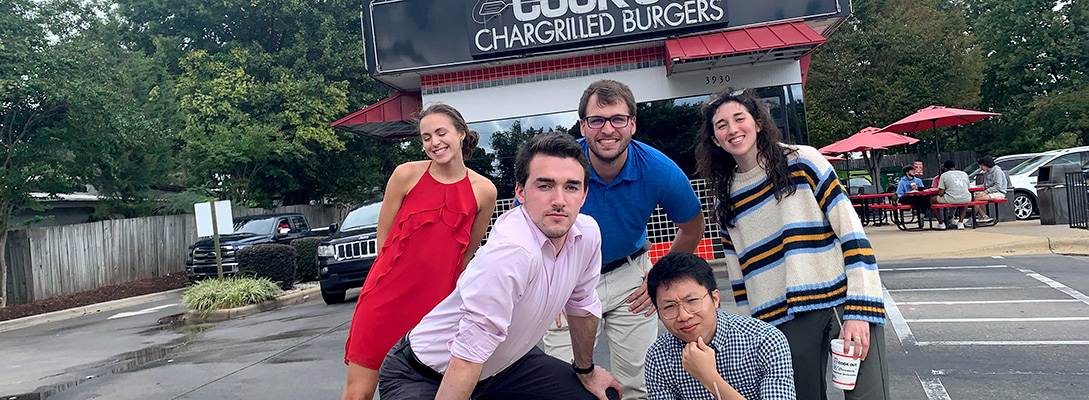As I’ve navigated balancing my coursework, personal growth, and career search, I’ve tapped into the many support systems available through the Institute for Advanced Analytics. Through conversations with my mentors, I’ve become confident in my abilities to face any challenge with the right perspective. In this post, I’ve shared exactly how I’ve come upon the habit of finding comfort in being uncomfortable by reframing my perspective.
Professional Development Team
One of my favorite aspects of the MSA program is the focus on personal and professional development. While we learn necessary skills, such as communication and teamwork, we are also exposed to tools needed to support emotional health, beat imposter syndrome, and build connections.
In one of my coaching sessions with Associate Director and Professional Development Coach, Kathy Green, I expressed my initial discomfort with virtual connections. I felt like I was missing out on the opportunity to chat with friends after class or connect with recruiters after an information session. Kathy helped me reframe how I was approaching this challenge by creating a relatable analogy. She helped me to see video-conferencing as a screen door, a tool that still allowed for connection, as compared to the shut door I had construed before. Shifting my perspective helped me transform a hindrance into a strength and enabled me to build lasting relationships.

Alumni Network
I quickly jumped on the idea of using virtual connections as an advantage and started reaching out to alumni. In some cases, I even found that it was logistically easier to meet virtually!
One of my conversations was with Sarah Wotus, IAA Class of 2020. I asked her, “what is the one thing you learned at the Institute that still helps you today?” Sarah shared that her most important takeaway was confidence in her ability to tackle new challenges and push herself to do something new and uncomfortable. This was a strength I had recognized in myself at times, but hearing Sarah say it made it clearer for me.
Sarah elaborates on her experience stating, “The Institute is unique in that it is an incredibly supportive environment but also one where you are likely to compare yourself to others. I would see my peers trying a homework assignment in Python instead of R, or I’d see another team lead supporting and lifting up their team in a way I’d never thought to do, and I would feel both inspired and intimidated. It was that unique combination of feelings that actually allowed me to realize that the best thing I can do is use this time to really admit when I’ve made a mistake or don’t know how to do something and then learn from my peers (instead of trying to “outperform,” which I often tried to do in the past). Because of that, I’ve now learned new skills, tips, and tricks for making life as a data scientist easier while being able to build relationships with my coworkers in this virtual environment!”
Just like Sarah, I’ve found myself challenged by vigorous projects and personal tests throughout this program, but I’ve learned how to convert them into an opportunity for growth. I’ve built a track record of deconstructing daunting tasks into achievable goals and instilled that level of confidence within myself. Moving forward, I know I’ll be able to achieve anything I set my mind to – as long as I find comfort in being slightly uncomfortable.
Career Resources and Communication Team
Finally, one of my favorite parts of the Institute is the focus on holistically preparing students for success after the program. One of our personal development lessons focused on growth mindsets. This concept is a way to reframe our thinking and look for progress rather than success. This allows us to face challenges with a passion for learning instead of a desire for approval.
When kicking off the career search, Teaching Assistant Professor, Dr. Sarah Egan Warren, helped us implement growth mindsets. She shared a video with the class to address common concerns about recruitment and suggested we reframe our worries as opportunities to learn and convert our nervousness into excitement. Implementing this showed me how just a simple perspective change can shift how we approach a situation!
Pushing myself to be uncomfortable has led to some of the most transformational experiences I’ve had. It isn’t a revolutionary idea; in fact, we’re taught about it in many different ways. Actively changing my perspective and practicing a growth mindset has helped me tackle challenges, and I’ve compiled the different lessons I’ve learned into an action list which I hope helps you find comfort in being uncomfortable!
- Push yourself out of your comfort zone – try new challenges!
- When faced with an obstacle, reframe your perspective to find the positives
- Focus on your growth, not on the outcome or on the competition
- Use your growth from each experience to build up confidence in yourself!
Namrata Jumani
